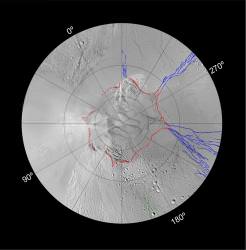When Cassini discovered geysers of water ice fountaining off of Saturn’s moon Enceladus, it was easy to think: life! Wherever we have liquid water here on Earth, scientists have found microbial life thriving; even in the strangest environments. A new model of just how Enceladus generates those geysers has made the possibility of microbial life being able to survive on Enceladus very unlikely.
When the geysers were first discovered, scientists dubbed the process “Cold Faithful”. In this model, tidal interactions between Enceladus and Saturn heat the moon, creating shallow pockets of liquid water under an ice shell. Pressure builds up under the ice, causing it to burst open, and water ice to spray out into space.
But a new model, developed by researchers at the University of Illinois, explains how Enceladus could be producing geyser-like plumes of water ice without an environment hospitable to life. Instead, the process would be called “Frigid Faithful”, and wouldn’t require liquid water at all.
Enceladus is covered in a layer of stiff ice compounds called clathrates, which could go down to a depth of tens of kilometres. Even with a moderately warm heat source underneath the moon’s south pole, these clathrates could deform and create the tiger stripe cracks and fractures which have been observed.
Instead of having pools of water near the surface, these cracks extend down up to 35 kilometres, and maintain almost the exact same temperature all the way down – as cold as 150 degrees below zero. And that wouldn’t be hospitable to life.
So where are the geysers coming from? As the clathrates dissociate, they produce gases that travel up the tiger stripes. This gas then leaks into space, and seen as the plumes that Cassini observed. Here’s what one of the researchers, Gustavo Gioia, had to say:
“This is indeed a frigid Enceladus. It appears that high heat fluxes, geyser-like activity and complex tectonic features can occur even if moons do not have hot, liquid or shifting interiors.”
Original Source: UIUC News Release


another interesting idea. this too would make sense, even though it is more tantalizing to think about the possibility of a secret underwater alien world 😀